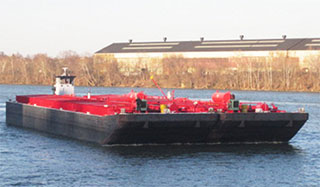The Coast Guard has withdrawn a proposed policy for standardizing the process and conditions for certifying barge operators to carry shale gas extraction wastewater in bulk, after an anticipated surge of applications failed to materialize.
In 2011 one tank barge operator applied to the Coast Guard for permission to transport shale gas waste water (SGEWW), a fluid mixture of water, drill mud and chemicals. Foreseeing that more applications would come to service the then-booming hydraulic fracturing drill industry in Pennsylvania and other northern Appalachian states, the Coast Guard set about developing a new policy.
The resulting October 2013 proposal immediately drew organized opposition from environmental and anti-fracking community groups, who submitted by far most of the more than 70,000 comments the Coast Guard received. Just 21 commenters called for the rule to be finalized.
While some wastewater is recycled at shale drilling sites, it is also shipped to disposal injection wells or recycling plants in Ohio and other neighboring states. At the time, the Coast Guard said it was getting inquiries from barge operators who thought they could carry wastewater more cheaply and efficiently than tanker trucks, or take it farther afield for disposal in Texas and Louisiana.
The proposed policy would have outlined a process for chemical analysis on each barge load of wastewater, with a radiation survey before any workers entered the barge and before changing over to another cargo. Radiation is an issue because of isotopes and radon gas in rock formations of the gas fields, and the proposal would have effectively set emission limits for waste water cargoes.
Anti-fracking groups in the Northeast hailed the Coast Guard withdrawal, but said they will continue to oppose individual applications for barge transport.
“By withdrawing this proposal, it’s a step in protecting our rivers and coasts from a catastrophic spill. The Coast Guard’s original plan would have allowed unregulated transport of fracking waste by barge on our waterways. Any accidents or spills of this waste would lead to a major environmental disaster,” said Jeff Tittel of the New Jersey Sierra Club.
But in a Feb. 23 notice in the Federal Register announcing the withdrawal, Coast Guard officials said they had not “received significant interest from industry” and that was also a factor in pulling back the proposal.
At least one oilfield fluid services company, GreenHunter Resources Inc, Grapevine, Texas, has continued to invest in and seek Coast Guard permits for handling more fracking wastewater, with a terminal and 70,000 bbl. storage facility on the Ohio River at New Matamoras, Ohio.
“Barge owners may continue to request case-by-case approval to transport SGEWW under current regulations by providing recent detailed chemical composition, environmental analyses, and other information for each individual tank barge load,” the Coast Guard said in its notice. The service will still “consider instituting a standardized process…after it has assessed whether current regulations are inadequate to handle requests for transport.”




